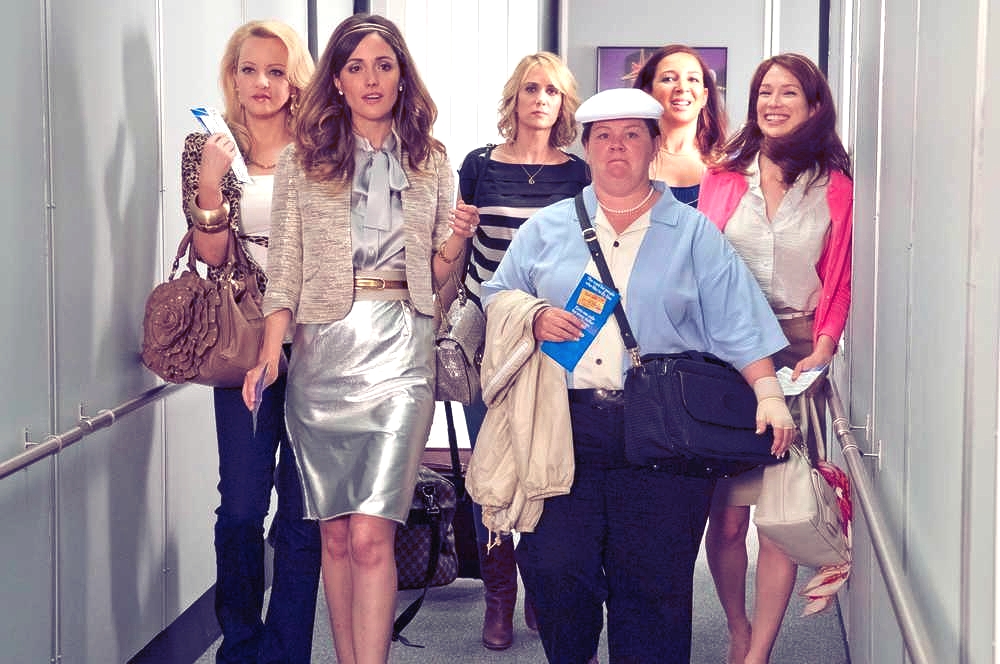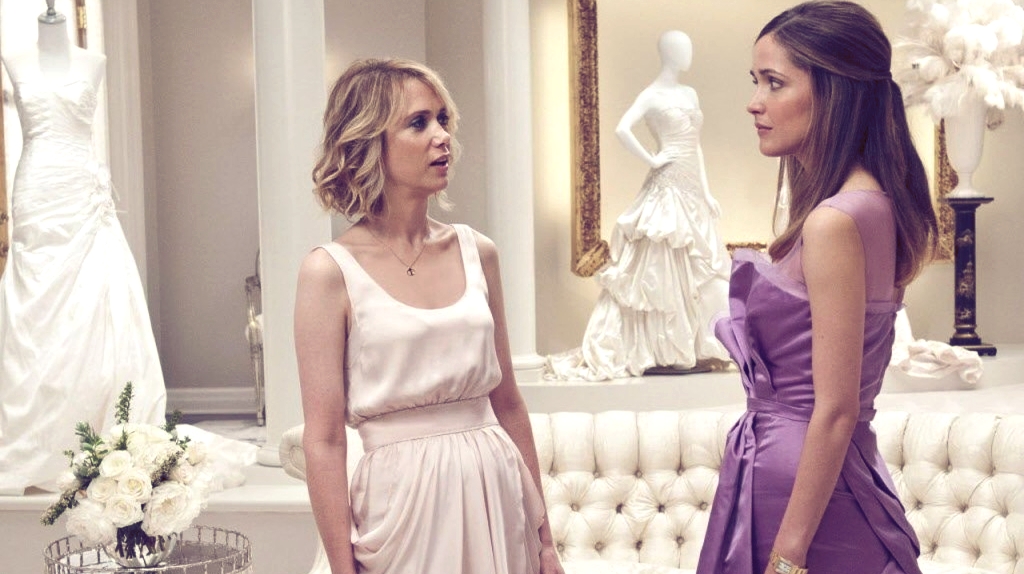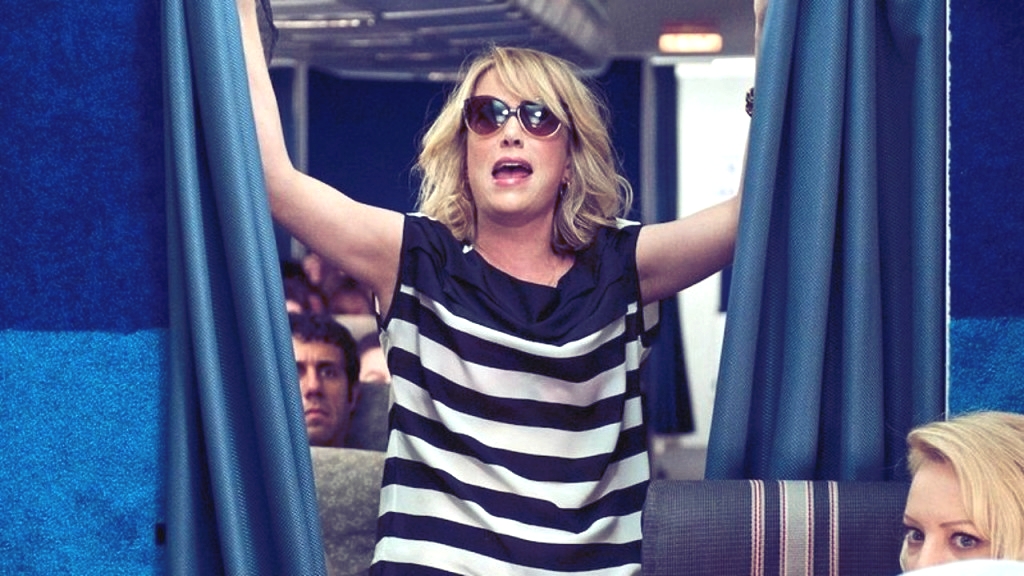
I’ve been thinking a lot about Bridesmaids, the Paul Feig-directed comedy set to celebrate its 10th anniversary this year.
After all, it’s not every box office hit, even a Judd Apatow-produced one, that has a term coined after it to measure its influence on an entire genre of movie-making. “The Bridesmaids Effect,” as it was first called in a Hollywood Reporter op-ed that ran shortly after the film’s surprisingly lucrative theatrical run, was intended to be an umbrella label that encompassed the scores of female-led comedies soaked in raunch and vomit and a very particular brand of feminism that would soon follow Kristen Wiig and Annie Mumolo’s brain-child.
The producer who penned it posited that entire genres might now be reimagined. “Chicks on horses. Women in space. Time-shifting gals.” All were now possible, and all were because Wiig — along with an insanely talented lineup of budding female comedians like Melissa McCarthy and Ellie Kemper, Wendi McLendon-Covey and SNL alum Maya Rudolph, hell, even Rose Byrne re-type-casting herself with a delightfully grounded turn — dared to imagine a group of women who retched, f*cked, and had explosive bouts of diarrhea in the middle of a traffic-laden street with the best of them. Them of course being the men — the John Belushis and Jeff Daniels, the Seth Rogens, Will Ferrells, and Seann William Scotts that defecated and ejaculated and projectile vomited on-screen to repulse and amuse audiences, a heady blend of nauseating buffoonery that people gladly tested their comfort-levels for.
That prediction — that Bridesmaids would revolutionize the world of comedy, making it possible for more women to step in front of and behind the camera — didn’t come to pass as quickly as most of us hoped. We had to slog through years of fairly formulaic remakes from studios who thought the success of Feig’s bridal escapades was because he’d taken the tenants of bro-comedy — the gross-out humor and heinous antics — and substituted the men who performed them for women.
In reality, what Bridesmaids did was much more difficult — it crafted a genuinely moving, achingly authentic story about the continual growing pains of female friendship. The hoagie-inspired sexual innuendos and Xanax-fueled in-flight meltdowns were just icing on top of the giant, stupid f*cking cookie.
The Apatow Effect

Judd Apatow is a prolific producer, a man responsible for most of the raucous, free-wheeling, drug-laden ridiculousness that lines the DVD shelves — or, more accurately, the virtual queues — of current and reformed frat-bro boyfriends around the world. Apatow’s male-centric comedic adventures guarantee a good time, normally at the expense of their schlubby, nerdy, every-man hero’s dignity. They often revolve around bearded, middle-aged Peter Pans who are confronted with the harsh realities of adulthood and attempt to conform (while suffering through a series of comedic mishaps), before trudging their own path that walks the fine line between acknowledging one’s own impending mortality and sampling from the hard-partying, pot-smoking fountain of youth when nostalgia demands.
His are the Knocked Ups, the Superbads, the Forgetting Sarah Marshalls, and 40-Year-Old Virgins. Judd Apatow makes movies that are hilarious and often endearing, but they are firmly rooted in the male gaze. Bridesmaids was something different — a chance to champion the bawdy, foul-mouthed humor that lurked inside so many of the female comedians his films had relegated to side-kick status, but its genesis was similar to other Apatow projects. Kristen Wiig had a bit part in another Apatow title and, as he did with Steve Carell during shooting for Anchorman, the producer hit her up for ideas.
“This was before people [knew] who Kristen was from SNL,” Apatow told The Daily Beast. “She would just get giant laughs right off the bat. So I just said to her, ‘Let me know if you have any ideas for a screenplay for yourself.’ That’s what happened on Anchorman when I worked with Steve Carell. He had the idea for The 40-Year-Old Virgin.”
As it happened, Wiig and her writing partner Annie Mumolo did have an idea — a story about a woman hitting rock bottom as her best friend readied to begin the next phase of her life. It would take years of honing a script and bringing on the right director — a fairly green Paul Feig — before that journey took shape on the screen.
“I’d been wanting to make female-led comedies forever, but every time I would pitch something like that, I would be told, ‘Oh, they don’t make money,’” Feig told Uproxx. “I was green enough in the industry to go like, ‘Oh, they know something I don’t know. I’m so embarrassed that I pitched something like that.’ Then after a while, you start to go like, ‘Well, wait a minute. This is crazy. Why can’t women star in a comedy?’”
It’s a fairly quaint question to entertain now, but back then, it was probably revolutionary.
After all, Christopher Hitchens had just penned an op-ed for Vanity Fair titled “Why Women Aren’t Funny” in which he equated an entire gender’s lack of humor with the physiological and psychological demands of childbirth. Women aren’t funny, he wrote, because they’re consumed with more serious issues of propagating the human race — the sole reason for their existence — and because they know men suffer from a profound stupidity and inferiority complex that might be triggered by a woman with more wit. (His words, paraphrased, not mine.)
“It really looked like it was going to bomb in the lead up to coming out because the tracking wasn’t any good,” Feig says of the box-office pessimism the film faced early on. “But then it obviously took off. I was just thrilled as it proved that there is an audience for this kind of thing if you do it right.”
The New Kind Of Bathroom Humor

Doing it right, at least for Wiig, Mumolo, Feig, and the rest of the cast, meant finding organic ways of inserting gross-out humor into a story that dealt with everything from the ever-changing nature of female friendships to the financially draining wedding industrial complex. Wiig’s Annie, was a middle-aged woman who lost her business and her boyfriend, was rooming with a pair of weirdly-intimate twins (hello Rebel Wilson) and spending most of her time entertaining the sexual whims of a douchebag f*ck buddy — played with surprising comedic precision by none other than Jon Hamm. Her life, by definition, was messy. Juxtaposed with that was Rudolph’s character Lillian, Annie’s childhood best friend who’d found a fiance and a new, wealthier circle of acquaintances to hang out with. Lillian’s impending wedding — and all of the bridesmaid duties that came with it — only widened the divide forming between the two women.
The build-up to Lillian’s nuptials — and the competitive jockeying for Maid of Honor position between Annie and Rose Byrne’s Helen — set the stage for punchlines that took stereotypical humor and gender-swapped it. The bachelor party — a pinnacle of plenty of male comedic adventures — was given a twist. Instead of watching the women go wild on a Vegas vacay, with night-of mishaps forcing them to confront each other or work together, Bridesmaids accelerated the conflict timeline. The ladies never made it to Sin City, but Annie’s drug-fueled panic spiral mid-air served a similar purpose — alienating her from the rest of the group while driving home a larger theme of wealth, classism, and what happens when friends begin to operate in different circles.
The bridal shower — a puppy-peppered climax that tasks Wiig with doing some brilliant physical comedy as Annie finally voices her frustrations with Helen’s strange obsession with her friend — placed the unquestioned rituals involved in initiating single women into blissful matrimony under a spotlight and asked us to look at them more closely. Bleached a**holes? Chocolate fountains? A trip to Paris gifted from one woman to another? Were these really the things women wanted?
The engagement party, a set-up that introduces the film’s main players to one another, reworked the idea that women in competition must always resort to cattiness. Instead of trading jabs in their first meeting, Annie and Helen choose the infinitely funnier route of publicly embarrassing each other, and themselves, while we laugh along.
In each case, the key to subverting expected tropes and “feminizing” traditionally masculine comedic elements for Feig and company was, oddly enough, restraint.
“We shot for hours and hours all these passive-aggressive jokes from Helen going like, ‘Oh, did you come from work?’ making fun of her clothes,” Feig told us of that initial meeting scene. “They were really funny and I remember they all got giant laughs, but we all realized it was going to hurt the speech off because then you already know that they’re enemies.”
“Even the studio wanted us to keep all those jokes and we were like, ‘No, let’s just make that scene completely innocuous and pull all the jokes out of it.’ The joke is that Helen turns around in this gorgeous gown, she looks beautiful, she comes over, she’s really nice, and everybody in the audience hates her guts immediately. But then it makes that speech contest so much funnier because you don’t know at first, is she competing with Annie? Is she not? Then it just gets ridiculous. That’s the kind of restraint you have to have. You have to throw out some really good jokes, which a lot of people don’t want to do. But good jokes can wear out an audience if they’re not timed right.”
Restraint even came into play during the film’s scatological piece-de-resistance: the food poisoning scene.
After dining at a fairly suspicious Brazilian restaurant championed by the maid of honor, Annie, the group heads to a swanky bridal boutique where Helen is able to score them a last-minute booking. Annie’s empty bank account comes into conflict with Helen’s preference for impossible-to-pronounce couture, but before the women can brawl over price tags, Meghan (McCarthy), Rita (McLendon-Covey), and Becca (Kemper) race to the store’s only bathroom where they defile sinks, toilets, and designer dresses with their out-of-control bodily fluids.
That scene was not in the original script and it’s one even Wiig was concerned about during the filming process.
“Kristen had moments in the lead-up where she was a little worried about it because basically two dudes are directing and producing this movie,” Feig admitted. “Originally, it was just Annie trying to talk Helen into these cheap, shitty dresses. Then Kristen puts on the fancy dress in the dressing room and has this harlequin-romance-novel fantasy in her head about what her life would be like if she could afford this dress. It’s her running through the woods, and Matt Damon’s chopping wood, and then he’s like, ‘Run into my muscles,’ and all this. It was very funny. It just didn’t advance the plot in a way.”
Instead, Feig worked with Wiig and Mumolo to build a scene where Annie’s carefully crafted facade quickly falls apart.
“There’s a reason for it other than, ‘Let’s be outrageous,’” he explained. “In the funniest, most relatable way possible, we wanted to tell the story of somebody with no money who is trying to compete with somebody with a lot of money. To look good to their friend, they take them to a shitty restaurant and say it’s a great restaurant and then cannot look bad, cannot look like they made a mistake in front of the rich friend. That’s the setup and it’s a very relatable thing, but then the comedy of it’s going to come from the fact that once you realize you screwed up, you could not admit that you screwed up. You have to hold the line.”
So yes, there’s McCarthy simulating a detonating case of diarrhea in a sink and Kemper spewing vomit onto McClendon-Covey’s head, but Feig puts the horror of the situation into focus, crafting tension by constantly cutting to Wiig’s sweaty, Almond-Joy snacking stand-off with Byrne and having the only sound effects be the women shouting, apologizing, and pleading with each other to look away.
“In the face of overwhelming evidence, how is she going to still pretend this didn’t happen?” Feig questioned. “The fun is the overwhelming evidence, which is, ‘Oh my God, we’re all white-faced, we’re going to be sick, we’re either going to throw up or sh*t our pants.’ It wouldn’t be funny if it wasn’t for cutting back to Kristen going like, ‘I’m fine. I feel fine. That restaurant was great.’ It’s always funny to me that the takeaway for a lot of people is just like, ‘Oh, let’s just do a gross-out scene.’ It’s like, ‘No, it’s got to have a reason for existing because then you feel empathy for everybody in it and you’re laughing because you feel so bad for everybody.’”
That scene’s most memorable shot might just be Rudolph’s dramatic finale, one that sees her running into traffic, desperately searching for a toilet before slowly sinking to the pavement, a resigned expression on her face, while quietly muttering “It’s happening” over and over again. It’s another example of how good writing and a woman’s perspective challenged the expected punchline, rewriting the film’s comedy DNA.
“We had two different ways we wanted to do it,” Feig says. “One was that her diarrhea was so explosive that it literally blew her off her feet and she slid across the street. When we were talking about it in the writer’s room, Annie Mumolo was like, ‘Or she would just slowly sink down in the street going, ‘It’s happening, it’s happening, it’s happening.’’ Clearly, we know which one was funniest.”
“Chick Flicks Don’t Have To Suck” – an actual slogan pulled from the film’s poster

But Bridesmaids did more than just prove that women could be as funny and disgusting and f*cked up as their male counterparts — it made money, which meant it opened the door for other films of its ilk. There were underappreciated successors like Bachelorette and For A Good Time Call … There were ensemble-focused hang-outs like Bad Moms — a movie that took the exploits of Feig’s film and placed them in a domestic setting. There was Girl’s Trip, a movie that made history with the amount of money it scored at the box office while telling the story of a group of Black women trying to reconnect despite the pull of real-world obligations, and the less-impressive Rough Night, another bachelorette-party gone wrong that was bold enough to flirt with murder, heavy-drug use, and the most disturbing way to hide a body even if it rarely hit the mark. Just the fact that these two female-centered comedies about women behaving badly hit theaters in the same year feels like a testament to Bridesmaid’s cinematic influence.
There’s also the less tangible effect the film probably had, the way it changed perceptions of women in comedy and inspired creators to champion their own ideas. Amy Schumer credited Bridesmaids when discussing her own unapologetically filthy rom-com Trainwreck. The writers of Pitch Perfect admitted that their film wouldn’t have been greenlit without Wiig and Mumolo’s success. More than changing stubbornly archaic attitudes about women’s ability to tell a joke, Bridesmaids challenged an entire industry to weigh the desires of audiences it too often ignored, and it gave others a blueprint for bold experimentation within the world of comedy. It wasn’t the most radical, intersectionality-feminist piece of filmmaking possible, but it was revolutionary all the same.
So yes, I’ve been thinking about Bridesmaids a lot recently because I’ve been watching films and TV shows that clearly benefited from the trailblazing that Wiig and company unknowingly did in that movie. I see interesting, shameless meditations on the joys and tribulations of female friendship in films like Booksmart and Ibiza. I see the authenticity of women pursuing non-traditional paths in Someone Great and How To Be Single. With Shrill and PEN15, I see stories of messy, complicated women navigating growing pains that we often ignore.
I see Bridesmaids in a lot of things on TV and in film right now. Hopefully, I’ll see it more.
